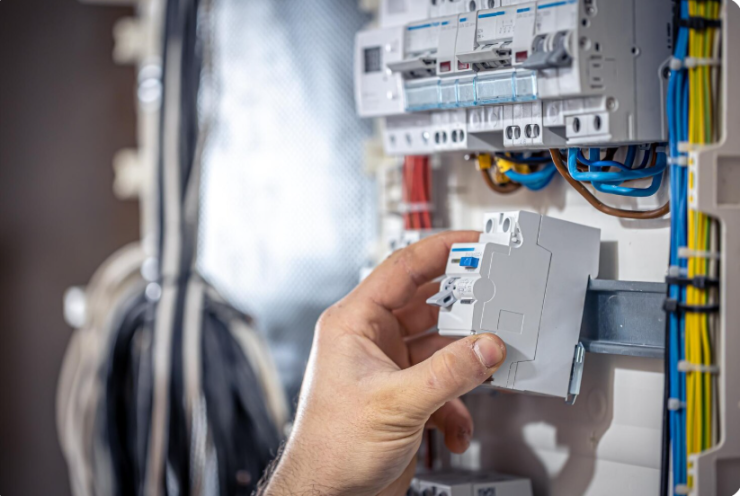Electrical systems form the backbone of modern homes and businesses, requiring professional maintenance, upgrades, and repairs to ensure safe, reliable operation. Quality electrical services protect your property while providing the power capacity needed for today's technology demands.
Electrical System Basics
Modern electrical systems distribute power through service panels to circuits serving different areas and functions. Residential systems typically operate at 120/240 volts while commercial systems may require higher voltages for equipment and machinery.
Moreover, with the popularity of e-vehicles amongst people, a huge number of existing homeowners have gotten an upgrade in their electrical systems. The new houses are built with a 400 amp capacity. The main reason behind this is the increased load on the system due to the e-vehicle charging stations.
Circuit protection devices like breakers and fuses prevent overloads that could cause fires or equipment damage. Ground fault circuit interrupters (GFCIs) protect against electrical shock in wet locations like bathrooms and kitchens.
Electrical codes specify requirements for outlet placement, circuit capacity, and safety devices. These codes evolve regularly to address new technologies and safety concerns. Professional electricians stay current with code changes and ensure compliance.
Residential Electrical Services
Home electrical services range from simple repairs to complete system upgrades. Common residential work includes outlet installation, ceiling fan mounting, and lighting fixture replacement. These seemingly simple tasks require proper techniques to ensure safety and code compliance.
Electrical panel upgrades become necessary when homes exceed existing capacity or when panels reach the end of their service life. Modern homes require significantly more electrical capacity than older systems provided.
Whole-house surge protection guards expensive electronics and appliances against power surges from lightning strikes, utility grid fluctuations, and internal electrical events. Professional installation ensures proper protection levels.
Commercial Electrical Applications
Business electrical systems serve more complicated needs than residential installations. Commercial buildings require three-phase power for large equipment, specialized lighting for work environments, and backup power systems for difficult operations.
Data and communication wiring demands have increased dramatically with modern technology adoption. Professional installation ensures proper cable routing, termination, and testing for reliable network performance.
Emergency lighting and exit signs require regular testing and maintenance to ensure functionality during power outages. Professional electricians provide testing services and replacement when needed.
Motor controls and industrial electrical systems require specialized knowledge for safe installation and maintenance. These systems operate at higher voltages and require different safety procedures than standard electrical work.
Safety & Code Compliance
Electrical work presents serious safety hazards requiring proper training and equipment. Live electrical circuits can cause severe injury or death through electrocution. Professional electricians use proper safety procedures and personal protective equipment.
Improper electrical work creates fire hazards through overheated connections, overloaded circuits, and faulty installations. These hazards may remain hidden for years before causing problems.
Building codes require permits and inspections for most electrical work to ensure safety compliance. Professional electricians handle permit applications and coordinate required inspections throughout projects.
Regular electrical inspections identify possible problems before they become dangerous or expensive to repair. Professional inspections should occur during property purchases and periodically for older systems.
Electrical Troubleshooting & Repairs
Electrical problems require systematic troubleshooting to identify root causes safely and efficiently. Symptoms like flickering lights, warm outlets, or tripping breakers indicate possible issues requiring professional attention.
Circuit overloads occur when electrical demand exceeds circuit capacity. Adding outlets or appliances to existing circuits may require upgrading wire sizes and circuit protection devices.
Old wiring materials like aluminum conductors and outdated insulation types present safety concerns in many older homes. Professional evaluation determines if replacement is necessary for continued safe operation.
Ground faults and short circuits create dangerous conditions requiring immediate professional attention. These problems can cause fires, equipment damage, and personal injury if not addressed promptly.
Energy Efficiency & Modern Technology
LED lighting conversions reduce energy consumption while providing better light quality and longer service life than traditional incandescent bulbs. Professional installation ensures proper dimmer compatibility and heat management.
Smart home electrical systems allow remote control and automation of lighting, outlets, and appliances. These systems require proper installation and configuration for reliable operation and security.
Electric vehicle charging stations require dedicated circuits and specialized equipment for safe, efficient charging. Professional installation ensures compliance with electrical codes and manufacturer requirements.
Solar panel installations require specialized electrical knowledge for safe interconnection with utility power systems. Professional installation ensures proper grounding, disconnect switches, and utility coordination.
Choosing Professional Electrical Services
Verify electrician licensing and insurance before hiring for any electrical work. Licensed electricians have demonstrated competency through testing and continuing education requirements. Insurance protects both contractors and property owners during work.
Compare service capabilities when selecting electrical contractors. Some specialize in residential work while others focus on commercial or industrial applications. Choose contractors with relevant experience for your specific needs.
Request detailed estimates for electrical work including material specifications, labor requirements, and permit costs. Professional estimates help you understand project scope and make informed decisions.
Emergency Electrical Services
Electrical emergencies require immediate professional attention to prevent injury or property damage. Signs of electrical emergencies include burning odors, sparking outlets, and power outages affecting only your property.
Many electrical contractors provide 24-hour emergency services for urgent situations. Establish relationships with reliable contractors before emergencies occur to ensure prompt response when needed.
Safety procedures during electrical emergencies include shutting off power at the main breaker if safe to do so and evacuating if electrical fires occur. Never attempt electrical repairs during emergency situations.
Professional emergency services include temporary power restoration, hazard isolation, and permanent repairs. Emergency rates typically exceed normal service charges but provide essential safety protection.
